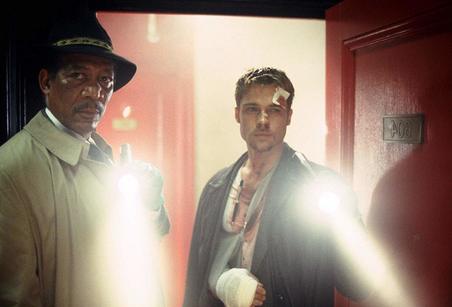Written by John Edward Betancourt When you boil it all down, movies are pretty by the numbers when it comes to crime stories. We meet an intelligent detective; our respective criminal and we are then treated to a fun and enthralling cat and mouse game before our intrepid gumshoe brings down the bad guy and the credits roll. That's not meant to be an insult to those films by any means, after all, everyone loves a happy ending. But sometimes it's a good thing to mix things up and surprise the audience along the way. Usually that's done with something a little more shocking on screen when it comes to the crime in question, or by changing up the formula for the characters. However, once in a great while, a film comes along that simply changes everything for its respective genre, turning every trope and every concept upside down and in 1995, the crime/murder story received one heck of an upgrade with David Fincher's Seven. The story to this one we all know and love because this is a film that most of us have watched over and over again to enjoy every little nuance because well...it's a brilliant motion picture. Few films in this genre have ever taken the time to present murder as an everyday thing, a job for detectives if you will like this film does. It doesn't glorify it or celebrate it in any fashion, as evidenced by Detective Somerset's views on life and his job for that matter, but it is part of this world. It happens, it's ugly and it's simply a thing to be dealt with and the rawness of that is stunning to say the least. Most of these stories feature a level of reflection upon life and the life taken, whereas this film focuses squarely on the fact that it is an act that has been completed, and the only thing that can be done about it is to find the person responsible as quickly as possible. But the bleakness doesn't end there. The lack of naming the city in the film, the constant rain and the design of this world consistently looking broken down and disheveled provides us with a grand dystopia where it seems that people are struggling to survive, and our intrepid detectives are overwhelmed and overworked as they desperately fight to bring justice and balance to a world that chugs along to the best of its ability. Plus, one cannot forget that John Doe as a character is unique in his own right. He is a cold and calculating villain of the finest caliber since he truly believes in the righteousness of his actions and well, the fact that in essence, (SPOILERS) the bad guy wins in this film makes for a jarring experience that has little for us to feel good about when all is said and done. So why then, do we continue to fawn over this movie and celebrate it considering darkness and despair permeates virtually every single frame of the film? Because the story is honest enough to present the world as the rough and tough place that we already know it is, and the fact that Somerset and Mills are actually trying to do some good in the world. Sure they may be surly and disenfranchised with the world they inhabit, but they feel they have no other recourse in this life but to do something worthwhile and that is perhaps the film's greatest trick, that there is hope buried in all that despair after all and it takes the time to teach us that while sometimes the bad guy does indeed win, there are those out there, still fighting the good fight, despite the odds being against them.
0 Comments
Leave a Reply. |
Archives
March 2025
|
|
© 2012-2025, Nerds That Geek LLC.
All Rights Reserved. |
uWeb Hosting by FatCow


 RSS Feed
RSS Feed